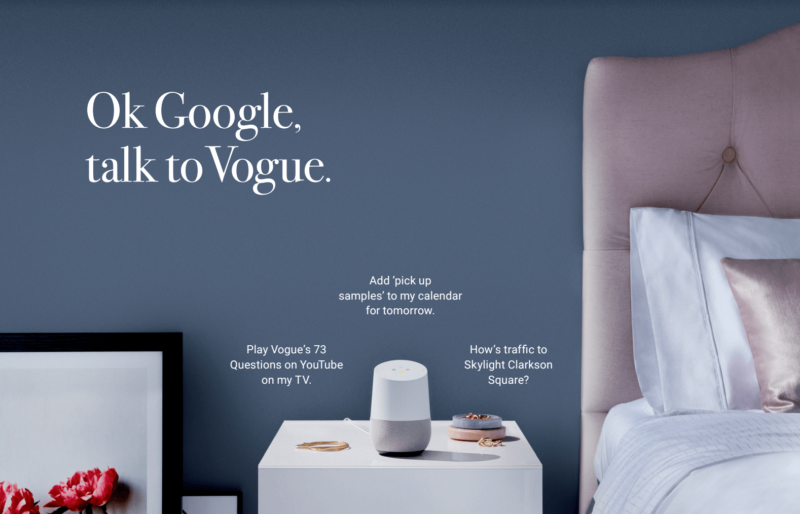Google Home partnership with Condé Nast’s Vogue offers new model for publishers
It points the way toward a new form of "interactive audio" with provocative branding, content and commerce possibilities.

In what is sure to be a model for other publishers, last week Google and Vogue magazine announced a partnership that offers “behind the scenes” audio content from selected Vogue magazine interviews. Most of these are monologues from the writers about their subjects.
By asking Google Home to “talk to Vogue” (one of several ways to invoke the content), users hear a brief introduction and then a menu of choices, which in this case includes five articles from the September issue on Jennifer Lawrence, Oprah Winfrey, Nicole Kidman, Serena Williams and Megyn Kelly.
There’s a corresponding indicator in the print magazine about which articles offer Google Home companion “behind the scenes” audio content. Each piece is split into shorter and longer segments. The speaker in each case is the author of the article initially answering the question, “What is [interviewee] like?” Then there’s an option to hear more in-depth information.
Julia Chen Davidson (Partner Marketing Lead, Google Home) told me that it was Google’s idea to approach Condé Nast but that the company was already in the process of exploring other content expansion and distribution options. When I suggested the experience was analogous to podcasting, she pointed out that the content from Vogue is more interactive, with the opportunity to select specific pieces in a non-linear order. “It’s more conversational,” she explained.
While this is the first such partnership for Google, the company is already talking to other publishers and partners. “There’s lots of curiosity,” Chen said. Indeed, this is something that many more publishers should explore sooner rather than later.
Google’s Chen wouldn’t discuss specifics but said that she and Google were “really pleased with the response” to the launch. To promote it, Google did a social/influencer campaign, and Vogue offered pages in the magazine (image above). The still photograph at the top of this page comes from a video, which shows a variety of women listening to the content as some browse the magazine.
This dual-media opportunity is very interesting because it could make some print content interactive and “trackable” in new ways (e.g., articles that drive Home engagement). It very quickly opens the door to voice-based commerce as well. One can imagine a partnership between Google (Express), a retailer or brand and a publisher to enable selected items in print ads to be easily ordered and delivered.
This is my speculation, however. Google didn’t talk specifically about monetization. As always with a new product, Google is focused on the consumer experience and “voice UI optimization,” as Chen described it.
Magazines have suffered significant subscriber and ad-revenue declines in the past decade. Publishers might be able to use Home (and other smart speakers) to extend their brands and content into this new medium and, in some cases, connect print and audio — to “digitize” the traditional print medium. (This is not unlike what out-of-home advertising has done with mobile-location data.)
But the model isn’t limited to traditional publishers. One can imagine brands and retailers creating entertaining or instructive audio content for smart speakers that is exposed or marketed via other channels: print, outdoor, TV, and even radio.
The Google-Vogue partnership points the way to a great many provocative scenarios ahead.
Contributing authors are invited to create content for Search Engine Land and are chosen for their expertise and contribution to the search community. Our contributors work under the oversight of the editorial staff and contributions are checked for quality and relevance to our readers. The opinions they express are their own.
Related stories
